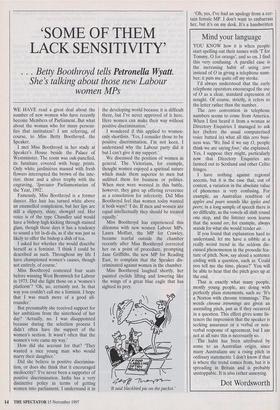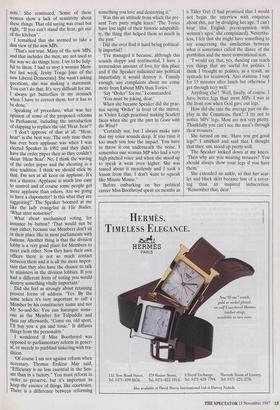`SOME OF THEM LACK SENSITIVITY'
. . . Betty Boothroyd tells Petronella Wyatt.
She's talking about those new Labour women MPs
WE HAVE read a great deal about the number of new women who have recently become Members of Parliament. But what about the woman who for many personi- fies that institution? I am referring, of course, to Miss Betty Boothroyd, the Speaker.
I met Miss Boothroyd in her study at Speaker's House beside the Palace of Westminster. The room was oak-panelled, its furniture covered with beige prints. Only white jardinières massed with fresh flowers interrupted the brown of the inte- rior; those and a silver trophy with the engraving, 'Spectator Parliamentarian of the Year, 1992'.
Famously, Miss Boothroyd is a former dancer. Her hair has turned white above an enamelled complexion, but her lips are still a slippery, shiny, showgirl red. Her voice is of the type Chandler said would have a bishop high-kicking through stained glass, though these days it has a tendency to sound a bit la-di-da, as if she was just as likely to offer the bishop a dish of tea.
I asked her whether she would describe herself as a feminist. 'I think I could be described as such. Throughout my life I have championed women's causes, though not entirely, of course.'
Miss Boothroyd contested four seats before winning West Bromwich for Labour in 1973. Did she fight those on a 'women's platform'? 'Oh, no, certainly not. In that way you couldn't call me a feminist I hope that I was much more of a good all- rounder.'
But presumably she received support for her ambitions from the sisterhood of her day? 'Actually, no. I was disappointed because during the selection process I didn't often have the support of the women's section. It wasn't often that the women's vote came my way.'
How did she account for that? 'They wanted a nice young man who would marry their daughter.'
Did she believe in positive discrimina- tion, or does she think that it encouraged mediocrity? 'I've never been a supporter of positive discrimination. India has a very distinctive policy in terms of getting women into parliament. I understand it in the developing world because it is difficult there, but I've never approved of it here. Here women can make their way without positive discrimination.'
I wondered if this applied to women- only shortlists. 'Yes, I consider those to be positive discrimination. I'm not keen. I understand why the Labour party did it but I can't give it my support.'
We discussed the position of women in general. The Victorians, for example, thought women enjoyed a spiritual nature which made them superior to men but unfitted them for business or politics. When men were worsted in this battle, however, they gave up offering reverence as a consolation for inferiority. Did Miss Boothroyd feel that women today wanted it both ways? 'I do. If men and women are equal intellectually they should be treated equally.'
Miss Boothroyd has experienced this dilemma with new women Labour MPs. Laura Moffatt, the MP for Crawley, became tearful outside the chamber recently after Miss Boothroyd corrected her on a point of procedure, prompting Jane Griffiths, the new MP for Reading East, to complain that the Speaker dis- criminated against women in the chamber.
Miss Boothroyd laughed shortly, her painted eyelids lifting and lowering like the wings of a great blue eagle that has sighted its prey.
It said blackbird pie on the packet.' `Oh, yes, I've had an apology from a cer- tain female MP. I don't want to embarrass her, but it's on my desk. It's a handwritten note.' She continued, 'Some of these women show a lack of sensitivity about these things. That old saying was cruel but right, "If you can't stand the heat, get out of the kitchen".'
I remarked that she seemed to take a dim view of the new MPs.
`That's not true. Many of the new MPs, and that includes the men, are not used to the way we do things here. I try to be help- ful to them. I had to stop a woman Mem- ber last week, Jenny Tonge [one of the new Liberal Democrats]. She wasn't asking questions, she was making a statement. You can't do that. It's very difficult for me. I always get butterflies in my stomach when I have to correct them, but it has to be done.'
Speaking of procedure, what was her opinion of some of the proposed reforms to Parliament, including the introduction of clapping to replace the old 'Hear, hear'?
`I don't approve of that at all. "Hear, hear" is the best way. The only time there has ever been applause was when I was elected Speaker in 1992 and they didn't have the order paper then so they couldn't shout 'Hear hear'. No, I think the waving of the order paper and the shouting is a nice tradition. I think we should stick by that. I'm not at all keen on applause. It's not a theatre. Applause is much less easy to control and of course some people get more applause than others. Are we going to have a clapometer? Is this what they are suggesting?' The Speaker boomed at me like the lady evangelist in Vile Bodies. `What utter nonsense!'
What about mechanised voting, for instance by button? 'That would not be easy either, because our Members don't sit in their place like in most parliaments with buttons. Another thing is that the division lobby is a very good place for Members to meet each other. Now they have their own offices there is not so much contact between them and it is all the more impor- tant that they also have the chance to talk to ministers in the division lobbies. If you had a different form of voting you would destroy something vitally important.'
Did she feel as strongly about retaining present forms of address. 'Yes. By the same token it's very important to call a Member by his constituency name and not Mr So-and-So. You can harangue some- one as the Member for Tolpuddle and then say afterwards, "Come on, old sport, I'll buy you a gin and tonic." It diffuses things from the personality.'
I wondered if Miss Boothroyd was Opposed to parliamentary reform in gener- al, or merely to purblind tinkering with tra- dition.
`Of course I am not against reform when necessary. Thomas Erskine May said, 'Efficiency is no less essential in the Sen- ate than in a factory." You must reform in order to preserve, but it's important to keep the essence of things, like courtesies. There is a difference between reforming something you love and destroying it.'
Was this an attitude from which the pre- sent Tory party might learn? 'The Tories have lost sight of their historic adaptabili- ty, the thing that helped them so much in the past.'
Did she ever find it hard being political- ly impartial?
`I've managed it because, although this sounds sloppy and sentimental, I have a tremendous amount of love for this place and if the Speaker indicated any political impartiality it would destroy it. Funnily enough, any complaints about me come more from Labour MPs than Tories.'
`Say "Order" for me,' I commanded. `You must be joking, dear.'
When she became Speaker did she prac- tice saying 'Order' in front of the mirror, as Vivien Leigh practised making Scarlett faces when she got the part in Gone with the Wind?
`Certainly not, but I always make sure that my voice sounds deep. If you raise it too much you lose the impact. You have to throw it out underneath the noise. I remember one woman MP who had a very high-pitched voice and when she stood up to speak it went even higher. She was teased about it mercilessly and I took a lesson from that. I don't want to squeak like Minnie Mouse.'
Before enibarking on her political career Miss Boothroyd spent six months as a Tiller Girl (I had promised that I would not begin the interview with enquiries about this, nor by divulging her age. 'I can't bear this English preoccupation with women's ages,' she complained). Neverthe- less, I felt that she might have something to say concerning the similarities between what is sometimes called the dance of the portfolios and the more conventional sort.
`I would say that, yes, dancing can teach you things that are useful for politics. I think I brought to politics, as a result, an aptitude for teamwork. Also stamina. I nap for 15 minutes after lunch but otherwise I get through very well.'
Anything else? 'Well, finally, of course, I have better legs than most MPs. I was in the front row when God gave out legs.'
How did she rate the average pair on dis- play in the Commons, then? 'I try not to notice MPs' legs. Most are not very pretty. Thankfully you can't see the men's through their trousers.'
She turned on me. 'Have you got good legs?' I smirked and said that I thought that they, um, stood up pretty well.
The Speaker looked down at my knees. `Then why are you wearing trousers? You should always show your legs if you have them.'
She extended an ankle, so that her scar- let and black skirt became less of a cover- ing than an inspired indiscretion. `Remember that, dear.'











































































 Previous page
Previous page